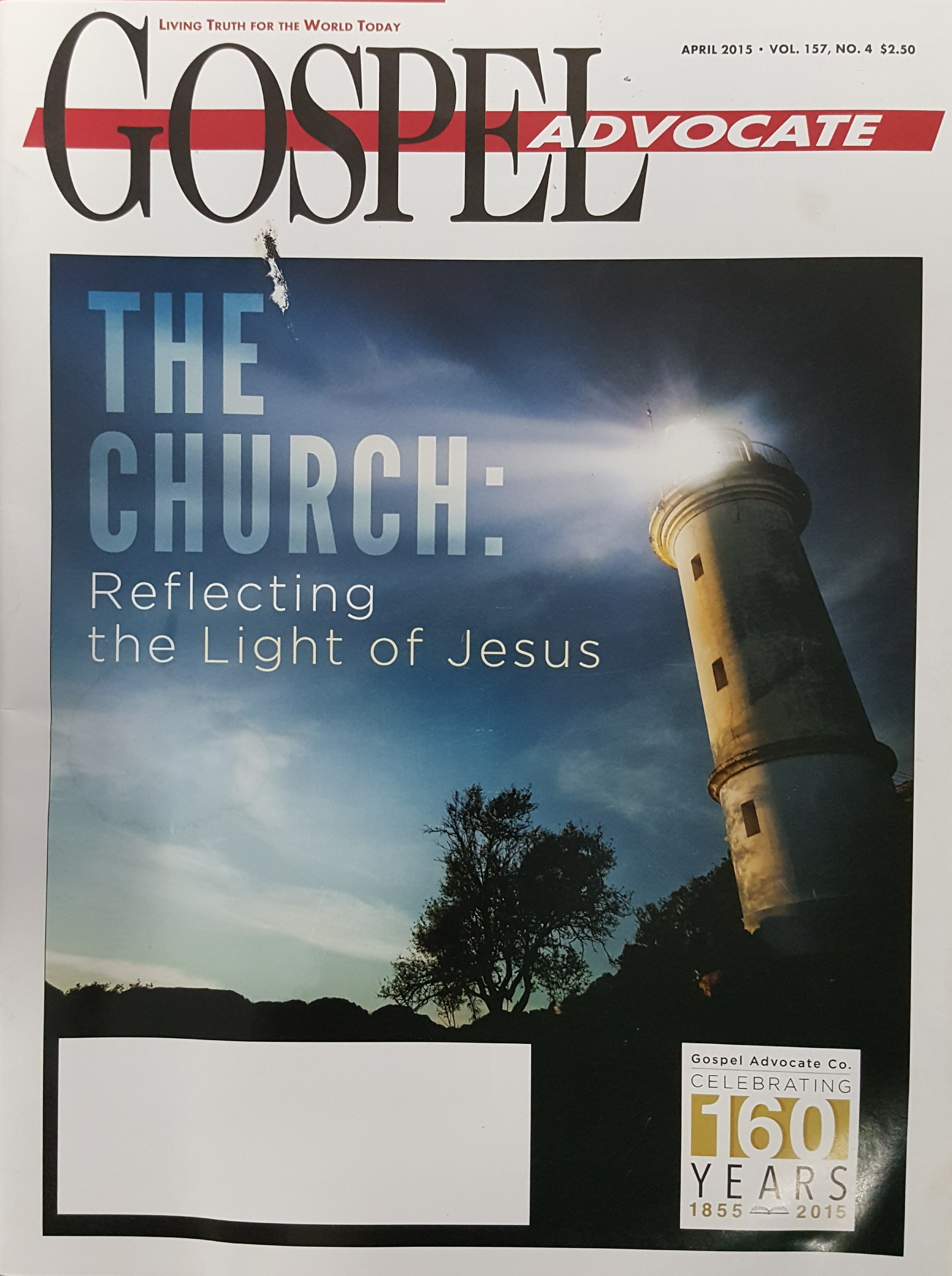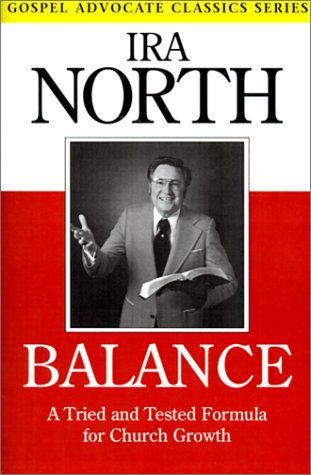
Reprinted from the April 2015 issue of Gospel Advocate Magazine.
Paul writes, “Do not be conformed to this world, but be transformed by the renewal of your mind, that by testing you may discern what is the will of God, what is good and acceptable and perfect” (Romans 12:2 ESV). It has been my experience that I am often unaware of the transforming process of the gospel until I see the contrast of who I used to be and who I am now. The transformation Paul speaks of reflects a fundamental change in character, and such change does not happen except by a “renewal” of the mind over a consistent and indeterminate period of time.
My story is of one foolish soul who was transformed by the gospel. I am afraid that at times I feel that I carry the memories of another man. Nevertheless, I was what I was, and I am what I am; may God be glorified by this thorn-riddled soul only to the extent that I find closure in my weaknesses and glory in His strength (2 Corinthians 12:7-10).
Before you are the beginnings of a hoodlum who was transformed by Christ, and that hoodlum (spoiler alert) was me. This is how I tell it.
The Transformation
One day in the summer of 1996, I was sitting on a rest stop at the corner of 24th and Mission streets in San Francisco, Calif. The intersection is a major hub in the Mission District, a major Latino district. Amidst the sounds of cars and bus traffic, the commotion of people talking and shopping, and bullhorn preachers shouting aloud, I came to a personal decision that would change my life forever.
At the time, I was a member of a local gang. I used drugs and alcohol. I was a high school drop out. I tried drug dealing. I was a thief. I was violent. The picture is rather rough, and the only reason I believe it is because I still have most of the memories.
That day I just wanted to relax. I was tired of it all. I saw girls calling home informing their families that they were never coming home (prostitution). I saw children in waves seeking to join our gang because they had created enemies in their own neighborhoods. I realized that I was just exhausted by the lunacy of it all.
I found myself at a fork in the road. What I wanted was an afternoon of drinking with my friends. What happened is that I realized that I had created a life full of potential dangers that forced me to think of ways to handle them. “If I go to the park,” I was thinking, “there is a good chance that along the way I would face the potential of retaliation.” At this point, I was not afraid of dealing with the problem. It was just that I was tired of the problem.
My mind raced with other options. I could take the 14 Mission (a bus) toward downtown, headed toward Pier 39. I had spent quite a bit of time there as a younger child, breakdancing for tourists with my big “brother” Rick (technically my cousin) on Fisherman’s Wharf. That thought quickly faded with the reality that I would pass through rival neighborhoods with those who would hurt me simply because of the color of my clothes (this is gang-banger logic). Again, I just wanted to relax.
I turned my attention southward, toward Daly City, a suburb of San Francisco. The broken record continued, “I just want to relax.” The last time I was on that bus route, some friends and I were shot at. In all fairness, we instigated it; still, I felt no need to travel alone just to prove a point. So I canceled that plan. It really dawned on me how much destruction and danger surrounded me because of my choices.
I said to myself, “go home and go out tonight.” I counseled myself, “make sure no one follows you.” I have gone to people’s homes banging on their doors in order to elicit a fight, so it was not beyond the possibility that I could be followed at some point. It was a life of paranoia. It was at this point when my heart uttered the words that would change my life forever: “I just want to go to heaven.” Those words made so much sense to me.
At some point, I found a Bible under my bed. It was inexplicable. I had no idea I even possessed a Bible! I began to search and read through the Bible with the feeling that I was getting closer to God. I look back at this moment much like I do when I read the conversion story of Cornelius in Acts 10 – yet in my sins, reaching for God, searching for His words to save me.

Many Hands
A few months later, Rick was visiting home while on leave from the Army. I didn’t know he had been baptized into Christ earlier in the year by his superior officer. He approached me in our living room with these words: “Jovan, I found the church.” I sarcastically responded, “Yeah, you found a church, great.” I was thinking in terms of the city cathedrals like St. Paul’s Catholic Church, which was down the street, or Mission Delores, or even the Cathedral of St. Mary of the Assumption. Pick a saint, we Catholics had a cathedral for them.
Rick said, “No, I found the church that you can read about in the Bible.” This intrigued me, and I asked him to tell me more. By this time, I had read most of the New Testament, and I was already trying to be “Christian.” We proceeded to talk for a few months, and a couple of days after Christmas 1996 I was convicted by the gospel. I realized I needed to follow through with my change of heart, so I was immersed in water for the remission of my sins. I was added to the redeemed (Acts 2:47).

By and by, as we say, I became a member of the Civic Center Church of Christ in San Francisco. This is where my education in the gospel would lead me to face a series of challenging events and point me down the path to prepare myself for ministry. Much like the eunuch from Ethiopia (Acts 8), I had a wonderful mentor in Donald W. Hinds. If ever I had a father in the gospel, it was him; if ever there was a troubled child in the gospel, it was me. Don received me as Christ receives us all (Romans 15:7). I am forever indebted to his influence on my life, along with his son, David Hinds; together, they planted God’s Word in my heart, watered it, and in due season it bore fruit (2 Timothy 2:2; Amos 7:14-15; Psalm 1).
The truth is, I had no aspirations of preaching. Don had another thought altogether. Don sat me down every chance he could to teach me something new – well, new to me – during our Sunday lunch break between services. From studying the Bible to inspiring me to teach the gospel to believing in me to preach the gospel, it was in a very real way a tangible experience much like Paul and Timothy. Brethren, hands-on mentoring transforms young people.
One Wednesday afternoon I faced the consequences of leaving the gang life behind. I was confronted with the decision to return to the street life I had left behind. I was surrounded by my former “associates” with an ultimatum. My conviction to Christ led me to be beaten and left lying in a driveway in some small street in the Mission. I remember telling my family that I had left the gangs behind. I remember attending Wednesday night Bible study that very night, telling my friend and mentor Don, “I sowed to the flesh, and I hope I reaped its final harvest.”
My wife has also been a transformative figure in my life. On March 3, 2001, I assumed the challenge of being the head of my own household; actually, I believe Cindy Tuggle accepted the challenge of being my wife. I would love to say that I have been the best husband ever, but I can only say that I have been a better man and husband because we have overcome so much together. The reason for our success has been trusting in God’s transforming Word to take what we have made of our lives and reform it to His glory. Today after 14 years of marriage, we are blessed with three children – something I never thought possible.
Pressing Forward
I have made many mistakes along the way, so it is hard for me to speak of transformation. God’s grace continues to inspire me to renew my mind and transform. This much is certain, transformation through the gospel is possible – no matter who you are, no matter where you have been, no matter what you have done, there is a place for you in the kingdom of God. I was a knuckle-headed thug from the streets of San Francisco who became a Christian, and through the grace of God a husband, a father, a preacher, and at times a mentor. Pray for me that I may:
“know him and the power of his resurrection, and [that I] may share his sufferings, becoming like him in his death, that by any means possible I may attain the resurrection from the dead” (Philippians 3:10-11).
Jovan Payes preaches for the Highland Church of Christ in Bakersfield, Calif.
To subscribe to Gospel Advocate, click here.





